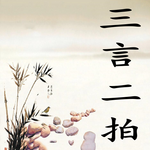
Sanyan Erpai (Simplified) is a collection of five famous legendary short stories in the specified period. The "three words" are: Yu Shi Ming Yan, Jing Shi Tong Yan, awakening the world persistent words. The author is Feng Menglong. "Second Pai" refers to: Surprise in the first moment, surprise in the second moment, surprise in the second moment. Author Ling Zhuchu.
advertisement
| 名前 | 三言二拍 |
|---|---|
| バージョン | 1.8.7 |
| アップデート | 2024年09月16日 |
| サイズ | 20 MB |
| カテゴリー | 書籍&参考書 |
| インストール | 1千+ |
| 開発元 | Stoxline |
| Android OS | Android 5.0+ |
| Google Play ID | com.stoxline.sanyanerpai |
三言二拍 · 説明
Sanyan Erpai (Simplified) is the collective name of five famous collections of legendary short stories and imitative stories. "Sanyan" is the collective name of "Yu Shi Ming Yan", "Jing Shi Tong Yan" and "Xing Shi Heng Yan". The author is Feng Menglong of the Ming Dynasty. "Er Pai" is the collective name of the Chinese novel collection "The First Moment Pai An Surprise" and "The Second Moment Pai An Surprise". Author Ling Zhuchu.
There are 40 articles in each episode of "San Yan", 120 articles in total. Published in the first year of the apocalypse (1621), the fourth year of the apocalypse (1624), and the seventh year (1627) respectively. Some of these works are compiled from the old books since the Song, Yuan and Ming Dynasties; some are re-created based on classical Chinese notebooks, legendary novels, operas, historical stories, and even social rumors. Therefore, the "Sanyan" encompasses the compilation of old books and the creation of new works. It is the beginning of Chinese vernacular short stories based on the art of rap and the literati's finishing and processing to the literati's independent creation. It "extremely imitates the differences between human feelings and the world, and prepares to write about the joys and sorrows" (the master of Xiaohua's "Preface to the Wonders of Modern and Ancient Times"), is the most important collection of vernacular short stories in the three dynasties of Song, Yuan and Ming. Its appearance marked the arrival of the climax of collation and creation of ancient vernacular short stories.
"Erpai" collected 70 novels in total. The vast majority of them are his creations that "take the miscellaneous things from the past and the present, can be heard, talk about humor, and act smoothly", which also implies the meaning of persuasion and punishment. The novels are based on a wide range of materials. There are a considerable number of works describing the life and ideology of the civilian class in the Ming Dynasty. There are also many works that expose the corruption and darkness of the officialdom of feudal society. They deeply reflect the social reality of the late Ming Dynasty. Positive meaning. Ling Xiaochu is also the author who has created the most imitative novels in China.
There are 40 articles in each episode of "San Yan", 120 articles in total. Published in the first year of the apocalypse (1621), the fourth year of the apocalypse (1624), and the seventh year (1627) respectively. Some of these works are compiled from the old books since the Song, Yuan and Ming Dynasties; some are re-created based on classical Chinese notebooks, legendary novels, operas, historical stories, and even social rumors. Therefore, the "Sanyan" encompasses the compilation of old books and the creation of new works. It is the beginning of Chinese vernacular short stories based on the art of rap and the literati's finishing and processing to the literati's independent creation. It "extremely imitates the differences between human feelings and the world, and prepares to write about the joys and sorrows" (the master of Xiaohua's "Preface to the Wonders of Modern and Ancient Times"), is the most important collection of vernacular short stories in the three dynasties of Song, Yuan and Ming. Its appearance marked the arrival of the climax of collation and creation of ancient vernacular short stories.
"Erpai" collected 70 novels in total. The vast majority of them are his creations that "take the miscellaneous things from the past and the present, can be heard, talk about humor, and act smoothly", which also implies the meaning of persuasion and punishment. The novels are based on a wide range of materials. There are a considerable number of works describing the life and ideology of the civilian class in the Ming Dynasty. There are also many works that expose the corruption and darkness of the officialdom of feudal society. They deeply reflect the social reality of the late Ming Dynasty. Positive meaning. Ling Xiaochu is also the author who has created the most imitative novels in China.








